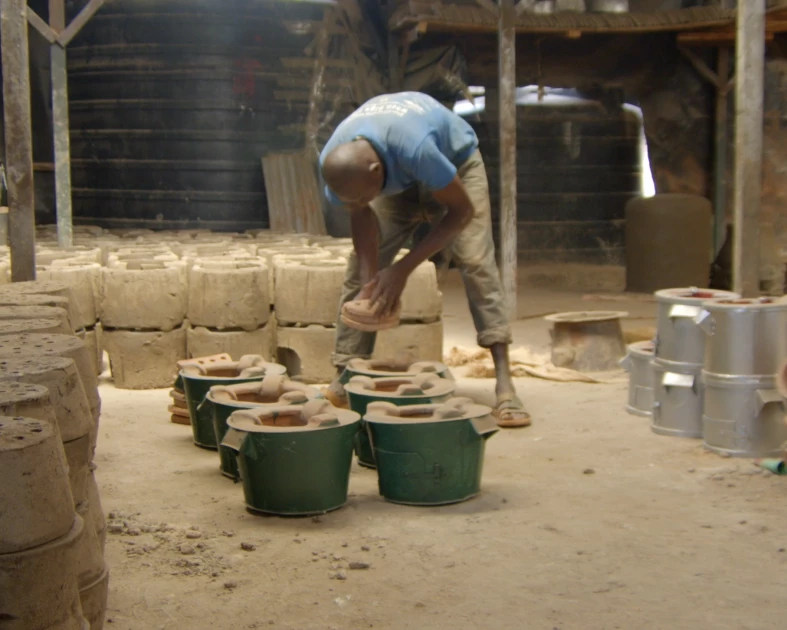Project to enable 1.6 million Kenyan households adopt clean cooking using improved cookstoves

A man making jikos

Audio By Vocalize
In Kenya, over 80% of the population relies on biomass as the primary source of energy for cooking and heating and according to data from the Kenya Household Cooking Sector Study 2019, about 7.3 million households use the Three Stone Open Fire.

Approximately 21,560 deaths per year are attributed to this indoor air pollution. This figure is seven times the average number of deaths caused by road accidents.
This is the reasoning behind the development of Improved Cookstoves under the GCF/EnDev Project as a holistic approach to promoting clean cooking technologies.
Improved cookstoves take many shapes: they can be made of different materials such as metal or clay; they can be portable or installed as a fixed part of a kitchen.
All these stoves have one thing in common: their combustion is much more completer and more efficient than traditional stoves or open fires.
This means that improved cookstoves save fuel and produce less harmful emissions.
Tests conducted on Improved Cookstoves show greater savings of energy. For stoves using fuelwood, they are 40% to 50% more efficient than 3 stones, while for charcoal stoves, efficiency is around 30-40% compared to traditional charcoal stoves.
The GCF/EnDev will have an impact in reducing national consumption of non-renewable biomass and thus lessen greenhouse gas emissions.
The project will enable a total of 1.6 million households to adopt Improved Cookstoves, benefiting approximately 8 million people.
It is commissioned by the Federal Ministry for Economic Cooperation and Development (BMZ) and co-financed by the Green Climate Fund (GCF) and Kenya’s Ministry of Energy (MoE).
The GCF/EnDev project is implemented by Ministry of Energy (MoE), GIZ, Practical Action (PA), Energy for Impact (E4I), Dedan Kimathi University of Technology (DeKUT), Strathmore University, Greenbelt Movement (GBM) and Kenya Tea Development Agency (KTDA) – Foundation.
The benefits of Improved Cookstoves include the money-saving component due to the use of less firewood or charcoal; it retains heat and cooks faster, it’s environmentally friendly and safe and has a significant smoke reduction.
While open fires have been used for centuries around the world because they can easily be set up, fit all pot sizes, and the heat from the fire can be quickly increased or reduced, traditional cookstoves and cooking practices are often very inefficient and produce high levels of pollutants such as particulate matter and carbon monoxide.
Open fires have traditionally also been used to provide warmth, light and a sense of comfort. In many cultures, the 3-stone fire traditionally forms the centre of the household and often holds cultural value.
Furthermore, open fires make use of firewood, agricultural residues or dung, which in rural areas are often the only available, accessible and affordable fuels for families.
However, in poorly ventilated kitchens, smoke inside and around the home can exceed acceptable levels for particulate matter a hundredfold.
Women and children are particularly affected by this indoor air pollution. Acute and chronic respiratory diseases such as pneumonia, and lung cancer are very common.
According to WHO, 4.3 million people per year die from exposure to household or indoor air pollution. This means, that every year smoke from traditional stoves kills more people than malaria.
Improved wood stoves offer a proven and successful technology to deal with these dangers.
Stove prices vary greatly depending on the material, size, number of potholes, construction time, and labour and transport costs.
An improved household cookstove for two pots made of local materials such as mud and constructed by a local artisan cost between Ksh.2,500 to Ksh.5,000 depending on the materials used.
Simple yet efficient portable ceramic stoves can cost from Ksh.300 to Ksh.500.
A portable metal stove made by a local producer may cost around Ksh.800 to Ksh.1000.
Prices of imported or industrially produced improved cookstoves may depend on duties, taxes, order quantity and shipping costs.


Leave a Comment